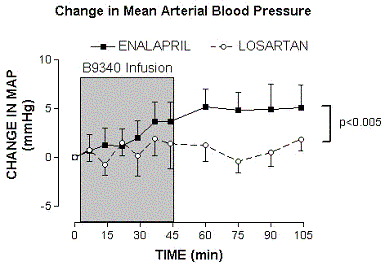| pA2 online © Copyright 2004 The British Pharmacological Society |
197P
GKT, University of London Winter Meeting December 2003 |
|
Bradykinin
contributes to the systemic haemodynamic effects of chronic angiotensin-converting
enzyme inhibition in patients with heart failure |
|
Background: Inhibition of angiotensin converting enzyme (ACE) reduces blood pressure and improves morbidity and mortality in patients with chronic heart failure (CHF). It remains unclear whether bradykinin contributes to the systemic haemodynamic effects of chronic ACE inhibition. B9340 is a potent and selective peptidic antagonist of bradykinin activity in man (Witherow et al, 2003).
Aims: To investigate whether the bradykinin antagonist, B9340, attenuates the systemic haemodynamic effects of chronic ACE inhibition in patients with heart failure.
Methods: 14 patients with CHF (NYHA II-III, EF<40%) maintained on chronic (>6 months) ACE inhibitor therapy received enalapril (20 mg daily) or losartan (100 mg daily) in a randomised, double-blind crossover trial. After 6 weeks of each treatment, patients underwent right heart catheterisation and were randomised to receive a systemic infusion of B9340 (2, 6 and 20 µg/kg/min for 15 min at each dose) or saline placebo.
Results: Mean arterial pressure (+5.2 mmHg; p<0.005) and systemic vascular resistance (+315 dynes.s/cm5 p=0.08) rose after B9340 infusion in patients treated with enalapril (n=10) but not losartan (n=10) or placebo infusion (n=6). Mean arterial pressure (figure 1), systemic vascular resistance, pulmonary artery wedge pressure and mean pulmonary artery pressure were greater following B9340 infusion in patients treated with enalapril compared to losartan (p<0.005, p=0.07, p<0.001 and p<0.05 respectively) or placebo infusion (p<0.005 for all). Cardiac output fell with B9340 infusion during enalapril therapy compared to placebo infusion (p<0.001) but not losartan.
Conclusions: Bradykinin contributes to the systemic haemodynamic effects of chronic ACE inhibition in patients with CHF. This may explain the apparent clinical differences between ACE inhibitors and angiotensin receptor blockers in the treatment of CHF.
Figure 1.

Witherow F.N. et al. 2003, ATVB, 23: 1667-70.